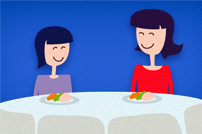Why Cooking & Eating Together is THE Best New Years Resolution
January 05, 2012
In 2011, the family dinner movement was finally brought into the media spotlight! Here at Better Together, we applauded the work of advocates like Jamie Oliver and Laurie David for helping broadcast the important benefits of eating meals together as a family.
In her book, The Family Dinner, Laurie David says that there isn’t a single issue related to parenting that CAN’T be solved around the dinner table. And the vast amount of research out, including our own research, supports this statement.
A couple years ago we teamed up with the BC Ministry of Health to conduct a study on the modern psychology of meals here in BC. We wanted to learn how we could promote and support eating together. Previous research showed that:
- Approximately one third of families rarely eat together.
- The culture and dynamics around family meals have shifted dramatically in recent years. While family meals used to be a given, now, due to busier schedules, families experience greater challenges around making meals happen. As a result, there is a trend toward families eating separately (individually). For example, letting the kids eat in front of TV or in front of a video game, or eating in the car.
- There is a clear link between eating together and significant health and social benefits for children, adolescents and older people, including improvements in family nutrition, social adjustment, and even childhood academic performance.
In doing our research (see the full findings here), we realized just how important it is to understand that meals are about much more than just food. From a very young age, meals and emotions are linked together in our minds and our lives. In fact, for most people their first meals bring together nutrition and emotion as one inseparable process.
What does this mean for families?
Well, it means that meals are often used as a way to pass on traditions of culture and religion through the experience of the meal. There are “feelings” around meals that help us better understand our families, and help foster a sense of belonging, which is important for self-esteem. One of the research participants we spoke with explained it this way:
“That’s an old traditional Chinese thing…When you’re served the meal, you’re told how much attention is in it. It was a warm soup with warm feelings in it. Love was in it.”
A similar research study at Emory University found that the reason why the dinner table is so powerful is because it is the number one place where family stories and history are passed on, and this knowledge of where a child’s family has come from is what helps builds resiliency in children and even in adults.
In spite of all of these benefits, the fact remains that our world has become busier and our schedules more crowded than ever, so making family meals happen is simply more challenging for the average parent.
We've discovered that the number one way to keep family meals happening is to make the experience fun for everyone and to avoid any triggers like guilt that cause parents to develop negative feelings around meals. We also learned how important it is to cook together as a means to eating together more often. This, in essence, is what we've been trying to encourage since launching the Better Together community two years ago. With your help, of course!
Better Together is a place where families of all kinds can come together to share resources, to help each other overcome challenges around meal times, and to remind one another how to keep meals fun. For example, finding meals you love and giving everyone a role to play. (Taco Tuesday, Pizza Friday) are just a few of the ways to build your own traditions and keep things fun at meal time.
This year, we want to hear from you even more! What are some of the challenges you’re facing? What are some of the tactics you’re using at home to prioritize family meals? Lets resolve to connect more as a community this year, and help one another keep this important resolution in 2012. Join the conversation here.

















(0) Comments